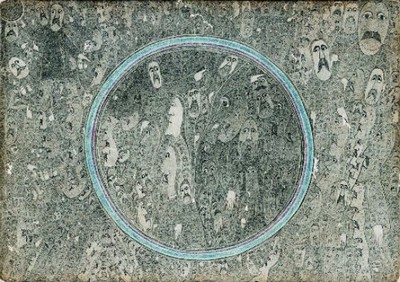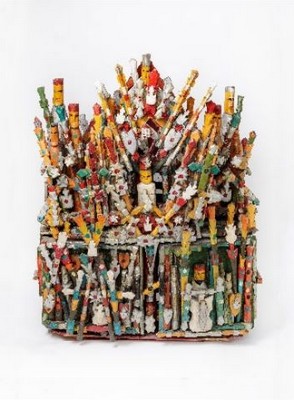Harbours of Unease. Art Brut in Poland
Olomouc Museum of Art
19 October 2023 - 25 February 2024
Woman, 1980s–1990s
Toothpaste, hardboard, 56 x 32 cm
Andrzej Kwasiborski’s collection, Płock
Dog, 1993
Wood, polychromy, 27 x 25 x 13 cm
Leszek Macak’s collection, Kraków
St. Veronica Wiping The Lord’s Face, N/A,
Oil, paper, 60 x 43 cm
Silesian Museum, Katowice
For the Worshipping of the Madonna of Częstochowa by Believers,1960
Pencil, paper, 42.7 x 51 cm,
Leszek Macak’s collection, Kraków
A motionless human face with a moustache and hundreds of watching eyes filling every millimetre of the paper. You can feel the tension, the fear, the anxiety, the eyes are everywhere, watching you until it gives you chills. The pencil drawings of Edmund Monsiel (1897-1962), who hid from the Nazis in the attic of his brother's house in Poland during World War II, depict one theme almost obsessively endlessly. The author eventually became completely isolated, suffering from autism and hallucinations.
This story also illustrates what art brut is - the art of untrained artists growing out of their inner tension, the urge to express themselves. Often these are people with mental issues or living marginalized. Olomouc Museum of Art will present their art at the exhibition Harbours of Unease. Art Brut in Poland. "Raw or crude art - art brut - differs from folk art, which is often linked to craftsmanship, or naive art that captures and often or idealises the surrounding world. Art brut artists draw from their inner self, they have their own inner universe whose vision they transfer into sculptures and paintings," explains the curator Šárka Belšíková. "They don't create for presentation, but out of an inner pressure for their own sake."
Polish Kings’ Gallery, 1990s
Wood, polychromy, 115 x 98 x 39 cm
Leszek Macak’s collection, Kraków
Adam’s Creation, 2015
Wood, polychrome, 78 x 60 x 15 cm
Leszek Macak’s collection, Kraków
An Animal, 1989
Fired clay, 29.5 x 43 x 27 cm
Andrzej Kwasiborski’s collection, Płock
For the first time ever in the Czech Republic, the Olomouc Museum of Art presents a comprehensive exhibition of Polish art brut. On view are around 200 paintings, drawings and three-dimensional objects by thirty artists from the first half of the 20th century to the present day.
In Poland, as in Czechoslovakia in the 1970s, interest in art brut was triggered by a wave of private collecting and survey. "Of particular note is the collection of the Krakow lawyer Lezsek Macak, from which a large part of our exhibition comes. Leszek Macak not only collected the works, but also took care of them and materially helped the creators of art brut, people on the margins, socially disqualified, yet with great creative potential," says Anežka Šimková, co-author of the exhibition. A new generation of collectors and theoreticians has emerged in 1990s who are striving to bring art brut closer to a wider audience and present this phenomenon abroad.
Thanks to these collectors, art brut is gradually becoming part of the world's leading collections and exhibitions. "A groundbreaking event was the inclusion of a selection of works by representatives of art brut and imaginative art from around the world in the main exhibition 55. Venice Biennale in 2013, where the work of the Czech artist Anna Zemánková shone. Another important world event was the inclusion of the gift of the collection of art brut collector Bruno Dechamp in the Centre Georges Pompidou's collection in 2021. The Paris museum has set a separate space for it in the permanent exhibition of modern and contemporary art, where Czech artists Adéla Ducháčová, Vlasta Kodríková, Slávka Lelková and others are also represented," Šimková lists. "Centre Pompidou has set out to make professional research on art brut one of its special long-term projects."
Two Women and a Man, 1980s
Markers, paper, 29.5 x 41.8 cm
Leszek Macak’s collection, Kraków
no title, 2006
Crayon, paper, 100 x 70 cm
Andrzej Kwasiborski’s collection, Płock
no title, 2013
Ferment, cardboard, 79 x 108 cm
Andrzej Kwasiborski’s collection, Płock
Pilgrimage, 2006
Markers, paper, 23.8 x 30 cm
Lue Lu / Brut Now Foundation, Poznań
HARBOURS OF UNEASE. ART BRUT IN POLAND - PUBLICATION
The exhibition is also accompanied by the first ever major entry of the topic in the Czech Republic, the Czech-English publication Harbours of Unease. Art Brut in Poland including rich pictorial accompaniment and expert studies. The curators of the exhibition - Šárka Belšíková and Anežka Šimková - map the history of art brut in the Polish environment. Polish theoretician Grażyna Borowik contributes to the understanding of the activities of the centres associated with psychiatric care, Małgorzata Szaefer opens up the issue of the current status of art brut in Poland. Barbora Kundračíková writes about the authenticity of art in relation to art brut. The book designed by Petr Šmalec, with two hundred pictures in it, includes a comprehensive catalogue of medallions of the artists accompanied by examples of their works. As a bonus, there is a chronology highlighting important art brut events in Poland and around the world.
CURATORS: Šárka Belšíková, Anežka Šimková
OLOMOUC MUSEUM OF ART
MUZEUM UMĚNÍ OLOMOUC
státní příspěvková organizace
Denisova 47, 771 11, Olomouc











